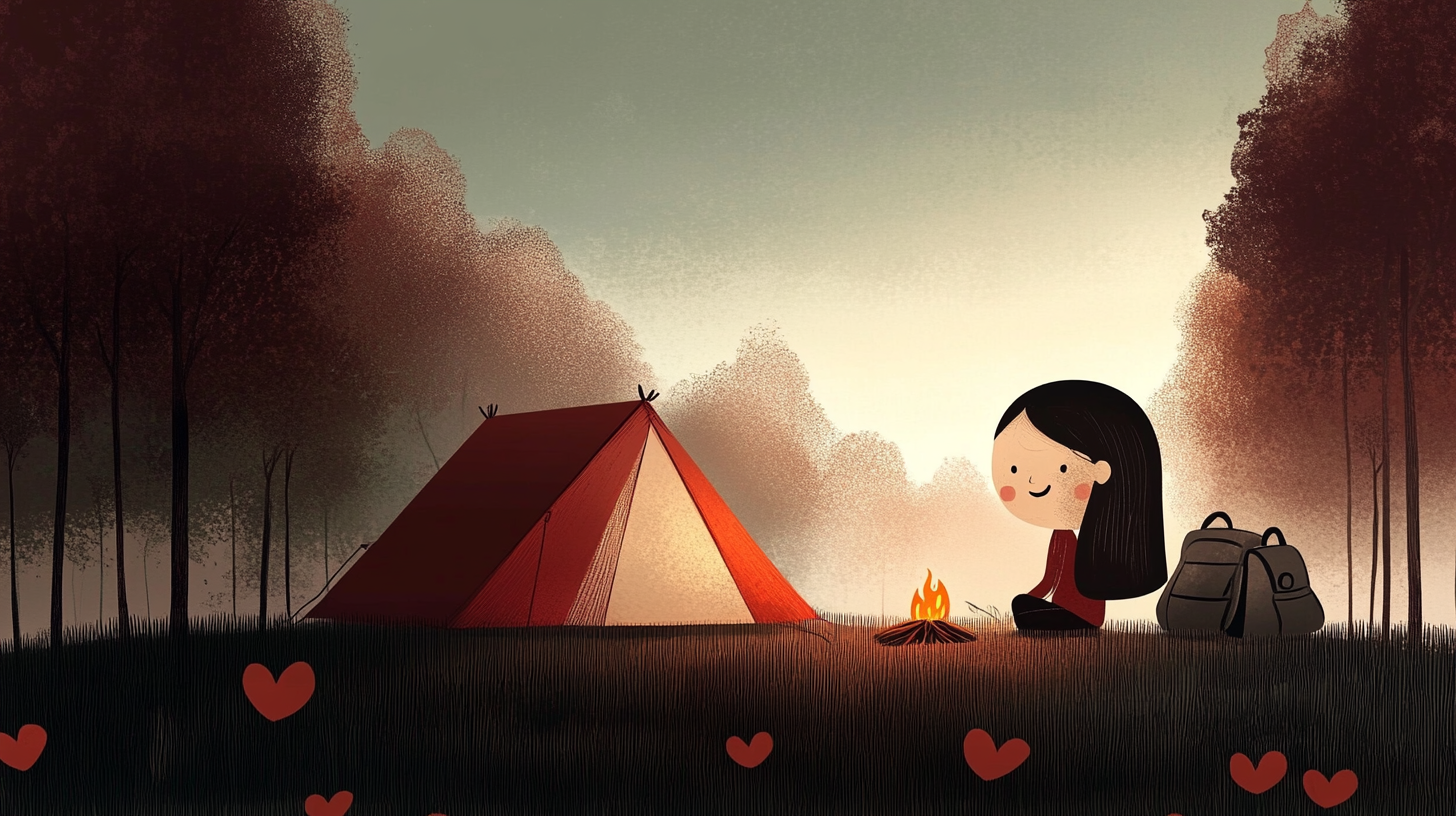Camp means staying outside for a night, usually in a tent.
以下は英単語 “camp” に関するストーリー型学習コンテンツです。まずは大枠の意味を理解して最後の文章で確認しましょう。
主な意味(main meaning)
| 品詞 | 意味 | 発音記号 | 英語例文 |
|---|---|---|---|
| 名詞 | 野外での宿泊、キャンプ場 | /kæmp/ | We set up our camp near the river. |
| 動詞 | 野営する、キャンプする | /kæmp/ | We camped in the mountains for two nights. |
| 形容詞 | 大げさな、芝居がかった(特に演技や服装で) | /kæmp/ | His performance was very camp and theatrical. |
語源(etymology)
「camp」はラテン語の「campus(野原)」に由来します。この単語は、もともと「平らな場所、開けた土地」という意味で、そこから「軍隊の野営地」や「仮の住まい」となり、現在の「キャンプ」という意味につながりました。
類義語(synonyms)
| 類義語 | 英語例文 |
|---|---|
| bivouac | They set up a bivouac near the trail for the night. |
| encampment | The soldiers built an encampment in the forest. |
| tent site | We reserved a tent site at the national park. |
| outdoor stay | The outdoor stay was exciting for the children. |
反義語(antonyms)
| 反義語 | 英語例文 |
|---|---|
| stay indoors | We decided to stay indoors because of the storm. |
| lodge | We lodged in a cozy mountain cabin instead of camping. |
コロケーション(collocations)
| コロケーション | 英語例文 |
|---|---|
| set up camp | They set up camp before the sun went down. |
| go camping | We love to go camping in the summer. |
| camp site | The camp site had a beautiful view of the lake. |
| camp fire | We sang songs around the camp fire. |
| summer camp | My brother went to a summer camp last year. |
2項表現(binomials)
| 2項表現 | 英語例文 |
|---|---|
| in and out of camp | He moved in and out of camp during the weekend. |
| rain or shine | We’ll go camping, rain or shine. |
英語ストーリー(english story)
Title: A Weekend at the Mountain Camp
Last summer, Emma and her friends decided to go camping in the mountains. They packed their tents, sleeping bags, and food. After a two-hour drive, they arrived at the camp site. The place was quiet and surrounded by tall trees.
“We should set up camp before it gets dark,” said Emma. They worked together and soon had their tents ready. That night, they sat around the camp fire, singing songs and roasting marshmallows.
The next morning, they went hiking. On the trail, they met a group of hikers who had made a small bivouac beside the path. “Camping like this is fun,” said one of them. Emma agreed. “It’s different from staying indoors all day.”
Later, it started to rain, but they didn’t mind. “Rain or shine, camping is the best,” said Emma. Her friends laughed. That night, they told stories in and out of camp, enjoying every moment.
Though the trip was short, they promised to come back. The outdoor stay had brought them closer. It was more than just a weekend—it was a memory they would never forget.
和訳
タイトル:山のキャンプでの週末
去年の夏、エマと友だちは山にキャンプに行くことにしました。テント、寝袋、食べ物を持って、2時間のドライブの後、キャンプ場に到着しました。そこは静かで高い木々に囲まれていました。
「暗くなる前にキャンプを設営しよう」とエマが言いました。みんなで協力して、すぐにテントを立てました。その夜、彼らはたき火の周りで歌を歌い、マシュマロを焼いて過ごしました。
次の朝、ハイキングに出かけました。道中、小さなビバーク(簡易キャンプ)をしているハイカーのグループと出会いました。「こんなキャンプも楽しいね」とその中の一人が言いました。エマも同意しました。「一日中家にいるよりずっといいわ」
その後、雨が降ってきましたが、誰も気にしませんでした。「雨でも晴れでも、キャンプは最高」とエマが言いました。友だちは笑いました。その夜もキャンプの中と外で物語を語り合い、楽しい時間を過ごしました。
旅は短かったけれど、また来ようと約束しました。この屋外での滞在は彼らをもっと近づけました。単なる週末ではなく、一生忘れない思い出になったのです。



コメント